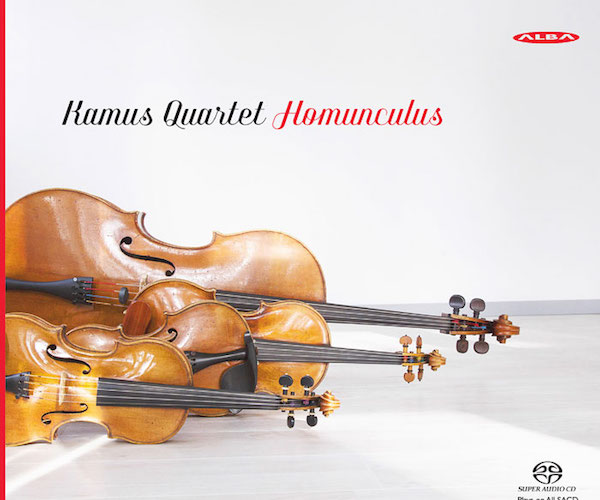Classical CD Reviews: Kamus Quartet’s “Homunculus” and Jeroen Van Veen plays Adams
The wait for the premiere of Esa-Pekka Salonen’s string quartet Homunculus was worth it; Jeroen Van Veen brings a fresh approach to the piano music of John Adams.
By Jonathan Blumhofer

It took long enough – nearly ten years! – to get the premiere recording of Esa-Pekka Salonen’s string quartet Homunculus. The wait, though, is worth it.
A jagged, densely-packed score, Homunculus presents four constantly transforming musical characters in a busy conversation. It’s a bit Carter-esque in concept, often harmonically astringent and full of driving rhythms. If you know Salonen’s orchestral music, many of the same (or similar) scale patterns and gestures that fill pieces such as Insomnia and the Violin Concerto are present, pared down a bit, perhaps, but still emitting plenty of force. Kamus Quartet digs into all of it, from the slashing tattoos that open Homunculus to its haunting, Sibelius-like closing chorale. It’s a fascinating piece, brilliantly played.
The Quartet is equally excellent in the disc’s other two selections, György Ligeti’s String Quartet no. 1 and Benjamin Britten’s String Quartet no. 3.
The former, the Hungarian master’s Bartók-influenced “Metamorphoses nocturnes,” is an extraordinary score, chock full of Ligeti’s captivating stylistic contradictions, in which episodes of terrifying dissonance, serene beauty, and laugh-out-loud wit (think Haydn transported to the 1950s) thrive, side-by-side.
Kamus draws out lots of the latter quality — the intoxicated waltz in the middle of the piece is a riot – but not at the expense of the others. Indeed, their playing is staggeringly precise, pitch-wise; thoughtfully voiced; rhythmically vital; and brimming with color. The final section, during which the score’s primary motive is heard underneath waves of natural harmonic glissandos, is simply breathtaking – and that’s just the last of a dozen (or so) such mesmerizing episodes in this performance.
Britten’s Third Quartet, with its spare textures and fragmentary gestures, makes a smart foil to the Ligeti. Expressively, it occupies similarly ambiguous ground, though its arguments are a bit more refined.
Kamus emphasizes the music’s cool, Classical restraint – the “Solo” movement (no. 3), in particular, is a marvelous display of alternating heat and cold – while also reveling in Britten’s inventive writing for the ensemble (theirs is a carefree, exuberant “Burlesque”). The big finale, “La Serenissima,” offers, in addition to shimmering colors and warm lyricism, a strong sense of pacing and understanding of musical drama.
The whole disc (released by ALBA), then, is an impressive showcase for the ensemble: technically, they’ve no weak links, and, interpretively, there’s little left to be desired here.

Pianist Jeroen Van Veen certainly has his credentials as an interpreter of contemporary keyboard fare. And his new disc of John Adams’ piano music (from Brilliant Classics) is played with plenty of power and assurance.
Take Van Veen’s reading of American Berserk, a score whose title seems to take on new meaning by the day. It’s slashing, aggressive, more than a little manic. Van Veen pummels the opening riffs but they never give way; even when they briefly disappear into fragmented syncopations and shards of melody, there’s always a nervous sense that they’re about to reappear, unexpectedly and menacingly, around the next corner. Which, of course, they end up doing. Throughout, the playing’s brilliant, confident, and sonorous; Van Veen’s is an exciting, visceral American Berserk.
Alas, his in-your-face approach doesn’t work nearly so well in Hallelujah Junction, a two-piano score in which Van Veen is joined by his wife, Sandra. From a technical angle, everything’s fine: the duo plays all the notes and they tend to glitter. But there’s relatively little sense of the score’s overriding lyricism and off-beat charm. You miss this the most in the last two movements, which, generally, are played too literally and without whimsy; the finale, in particular, quickly becomes stiff and shrill.
Better are Van Veen’s performances of China Gates and Phrygian Gates. Both are on the luxurious side, tempo-wise, though Van Veen keeps the line moving well enough and mines plenty of color out of each. Indeed, there’s something quite nice about encountering interpretations of these perennial Adams favorites that sound so comfortable – a pianist enjoying himself, freely exploring the enveloping diatonicism of the music.
Yes, these decisions result in readings that aren’t as structurally well-defined as they might be (the second half of China Gates, in particular, gets a bit flabby) but there’s never the sense that Van Veen isn’t in control of what’s going on. His, then, is a rather fresh approach that, Hallelujah Junction excepted, is mostly welcome in these pieces.
Jonathan Blumhofer is a composer and violist who has been active in the greater Boston area since 2004. His music has received numerous awards and been performed by various ensembles, including the American Composers Orchestra, Kiev Philharmonic, Camerata Chicago, Xanthos Ensemble, and Juventas New Music Group. Since receiving his doctorate from Boston University in 2010, Jon has taught at Clark University, Worcester Polytechnic Institute, and online for the University of Phoenix, in addition to writing music criticism for the Worcester Telegram & Gazette.
Tagged: ALBA, Brilliant Classics, Homunculus, Jeroen Van Veen, John Adams, Kamus Quartet
